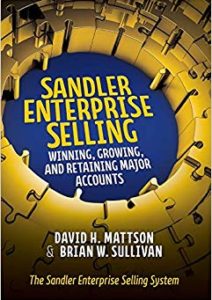Client for Life. It’s a noble goal, of course, especially in the world of enterprise selling where winning a major account can be a game-changer for a selling organization, with new streams of revenues and profits that follow such wins fueling organizational growth. But making the relationships sustainable requires focus, commitment, and significant investment of resources over time.
If you think about it, major account relationships are very much like marriage. When two people embark on a relationship’s courtship phase, that romantic time prior to marriage, both parties bring their very best to their future partner, hoping to be viewed positively every step of the way. In a pursuit with a large prospect, sales organizations work hard to show responsiveness, attention to detail and follow-up in every transaction, similarly hoping to be viewed positively with every touchpoint. In both examples, there’s much involved in earning the right to succeed. But it’s when the contract is signed and when the wedding reception has ended that the real work begins. That’s when the clock starts ticking on “‘Til Death Do Us Part”.
I’ve done a fair amount of consulting on the topic of client retention and I’ve morphed a quote about marriage into an enterprise selling version. “Account retention is not a noun. It’s a verb. It’s not what you get. It’s what you do”.
So, what is it that you do? What are the critical things you focus on to retain something you treasure so dearly, something that delivers tremendous value over the long term? First, you communicate constantly, making sure that your care and attention are clearly evident. And you foster a culture of mutual respect and common objectives, showing by your words and actions that you understand what is most important to your partner and that you’ll never fail to help them achieve their goals. And, of course, as those familiar with the evolution of both marriage and major account relationships will share, you adapt. Things change. People change. And organizations change. It’s really the only thing you can count on. So, with major accounts, you must always be aware of where you stand. But what’s more important is your ability to adapt and act on where you stand in every significant area. For not acting to constantly improve, in both marriage and major account relationships, is a death knell. Complacency has no place in either scenario.
Practically speaking, what can you do to increase the likelihood that your major accounts come as close as possible to that “Client for Life” goal? Think about it. In serving major accounts, most selling organizations are structured to take advantage of new opportunities and to fix delivery problems. Every hour, every day. Rinse, lather, repeat. Of course, reacting quickly to opportunities and problems is very important. But enterprise accounts are marketplaces in and of themselves, ecosystems demanding much more than quick response. Your constant understanding of what matters most to them is vital. And applying that knowledge to the critical areas of account retention is a survival skill in the enterprise world. If you’re not tracking your performance in those areas, constantly gathering information, and acting to improve your levels of service, your partnerships will be in jeopardy.
What are the areas in which your performance will have the greatest impact on keeping or losing major accounts? Let’s consider fourteen that, in large part, dictate whether you stay or go. There are others, of course. And, certainly, some are more important in certain business models than others. But trust that these are huge:
- Your Delivery of Real Value
- Ease of Communication and Access
- Your Buyer Network Coverage
- High-Level Executive Relationships
- Your Relevance in the Account – Going Deep and Wide
- The Variety of Products/Services you Deliver
- Your Wallet Share of Winnable Business
- Your Forecasted Account Revenue Growth
- The Profitability Levels in your Account Business
- Your Delivery Performance
- Your Understanding of the Account and its Industry
- The Account’s Satisfaction Levels
- The Trust Levels in the Relationship
- The Account’s Dependence on You
But how do you ensure improvement? You start by gathering your account team in frequent retention sessions to develop honest evaluations and ratings of your performance in each of the key areas. If your team members don’t know enough to come up with ratings in certain areas, that’s a big problem. To discover information your team can’t provide, use your network, client contacts, partners and others to help you connect the dots. Coming up short in terms of account intelligence is unacceptable. With realistic ratings developed for each of the areas, the next step is the most important. As a team, you craft corresponding action items for each area to ensure tangible improvement, even in areas for which you have identified very positive ratings.
Improve, improve, improve. Always improve.
Enterprise account relationships are hard to win and often even harder to keep. Stay on top of your performance and ensure that the improvement actions you execute on are highly visible to your accounts. Remember, they chose you as a partner for a reason. And they reconfirm that decision every single day. It’s your job to make sure they never have doubts.












Comments